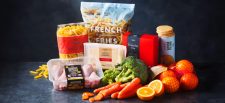Environment Secretary Emma Reynolds has set out further steps from the Department for Environment, Food and Rural Affairs (Defra), which will reportedly “drive down food costs”.
Reynolds set out the steps as inflation was reported to have fallen overall, while food inflation rose.
In two speeches to the Food and Drink Federation (FDF) and CLA Rural Business conferences, Reynolds announced Government’s plans to invite industry to apply for tariffs to be suspended on products they need that aren’t produced in the UK, as well as a new commitment to streamline regulation on the food sector wherever possible.
Defra said this would support the Chancellor’s targeted action to support the Bank of England in reducing inflation. The steps set out the choices the Chancellor will take to deliver on the country’s priorities of cutting the cost of living, cutting NHS waiting lists and cutting national debt.
In a speech to food industry leaders, the Environment Secretary stated: “Since joining Defra, I’ve been taking practical steps to bear down on food inflation and manage food costs for shoppers.
“By cutting red tape and keeping tariffs down we will help businesses deliver for customers and give them confidence to invest for the future.”
The Secretary of State announced two initiatives, which she said will “support the food industry”:
- To help reduce import costs, Defra, DBT and HMT will be launching a process inviting industry to apply for import tariffs to be suspended to cut costs and to keep the prices of key ingredients from large increases.
- A new Food Inflation Gateway will assess the impact of Government regulations on food businesses and their impact on food prices. By introducing new requirements, removing duplication and streamlining regulation where possible, Defra said this “should reduce unnecessary costs” for food businesses.
Both these measures aim to manage costs for manufacturers and retailers, avoiding these being passed on the consumers at the till. Defra said this will build on the EU reset deal that will mean less paperwork, lower costs and faster movement of goods for industry.
Supporting British food producers
In a separate address to farmers and landowners tomorrow at the CLA Rural Business conference, the Environment Secretary will set out how the Government is supporting the nation’s farmers to drive growth – with rural Britain contributing £259 billion to our economy and supporting over half a million businesses.
Reynolds is due to say: “This Government sees the rural economy as fundamental to our growth mission. When rural Britain succeeds, the whole country succeeds.
“From food production to protecting nature, we are acting on our ambitions for a countryside where businesses flourish, good jobs are created, and our communities are strengthened.”
She will discuss work to boost farming productivity alongside the Batters Review, due to be published before Christmas, including:
- Unlocking new markets for British produce with India, China and the USA.
- Tackling contractual unfairness in supply chains with our ‘Fair Dealings’ regulations.
- Committing nearly £250 million in farming grants to improve productivity, trial new technologies and drive innovation in the sector.
- Appointing Alan Laidlaw as the new commissioner for the Tenant Farming Sector.









